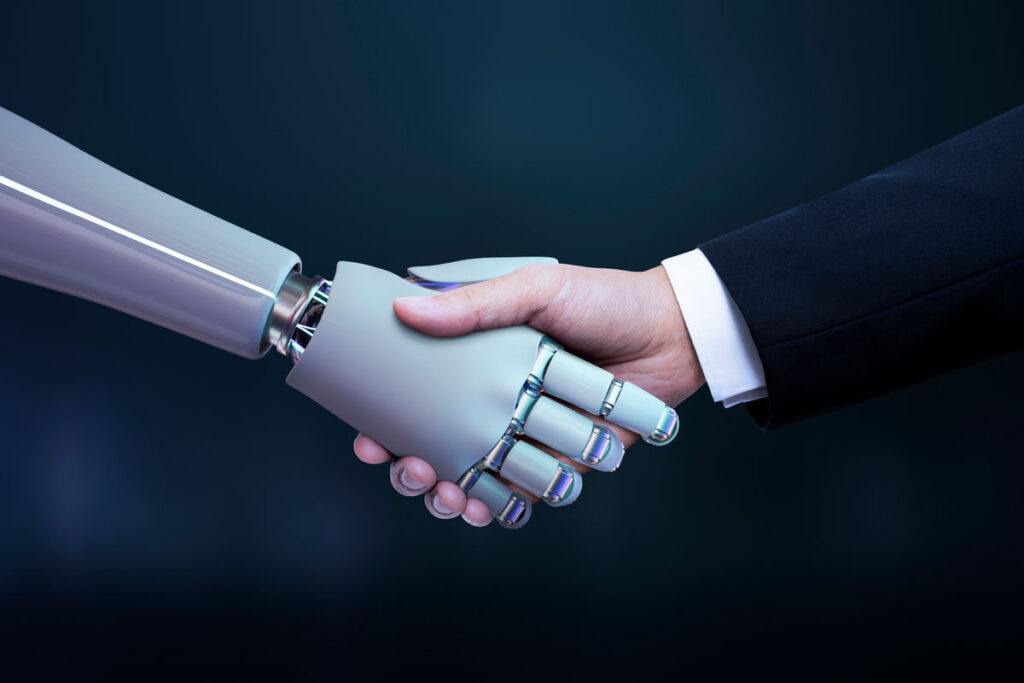Exclusive Neuroject Article: In the realm of project management, Artificial Intelligence (AI) stands as a transformative force, representing a suite of technologies that simulate human intelligence in performing tasks, processing data, and generating insights. Within this context, AI in project management serves as a powerful ally, augmenting traditional project management practices by introducing capabilities that revolutionize decision-making, optimize processes, and elevate project outcomes.
The adoption of AI in project management practices signifies a pivotal shift toward harnessing cutting-edge technologies to bolster efficiency, accuracy, and adaptability. Its integration empowers project managers and teams by enabling data-driven decision-making, automating routine tasks, and providing predictive insights that enhance the overall project lifecycle.
The significance of embracing AI in project management cannot be overstated. It heralds an era of unparalleled precision in forecasting, risk assessment, and resource utilization. By leveraging AI-driven tools and methodologies, project managers gain a competitive edge, equipped with intelligent systems that navigate complexities, anticipate challenges, and streamline operations.
AI adoption reshapes project management methodologies by infusing them with predictive analytics, automation, and advanced decision support systems. This paradigm shift signifies a departure from traditional approaches, ushering in a new era where data becomes the cornerstone of informed decision-making, enabling projects to adapt swiftly to changing landscapes and ensuring their successful fruition.
Table of Contents
An Overview of AI in Construction
Artificial Intelligence (AI) is revolutionizing the construction industry by introducing innovative solutions that enhance efficiency, safety, and productivity across various phases of a construction project. With its ability to analyze vast datasets, optimize processes, and automate tasks, AI is reshaping the way construction projects are planned, executed, and managed.
One of the pivotal areas where AI makes a significant impact is in predictive analytics and planning. AI algorithms can analyze historical project data, weather patterns, site conditions, and other variables to predict potential risks, project timelines, and cost estimates more accurately. This predictive capability enables better decision-making, minimizing delays and cost overruns.
Moreover, AI-powered tools like Building Information Modeling (BIM) software facilitate collaborative design and planning. These tools allow architects, engineers, and contractors to create detailed 3D models, identify clashes or conflicts before construction begins, and optimize designs for better resource utilization.
During the construction phase, AI-driven robotics and drones play a crucial role. Robots equipped with AI capabilities can perform repetitive or dangerous tasks, such as bricklaying, excavation, or site inspections, with precision and efficiency. Drones equipped with cameras and sensors enable real-time monitoring of construction sites, providing supervisors with valuable insights into progress, safety compliance, and potential issues.
AI’s influence extends to the realm of safety as well. Computer vision AI systems can analyze video feeds from cameras on-site to identify safety hazards, such as workers not wearing appropriate gear or potential accidents, allowing for prompt intervention to prevent mishaps.
AI in construction is streamlining processes, improving accuracy, and enhancing safety standards. As technology continues to advance, integrating AI-driven solutions will become increasingly crucial for construction companies aiming to optimize their operations, reduce costs, and deliver projects more efficiently in a rapidly evolving industry.

Evolution of AI in Project Management
The evolution of Artificial Intelligence (AI) within project management has been transformative, reshaping how projects are planned, executed, and delivered. Initially, AI’s role in project management was limited, but over time, it has undergone significant evolution.
Early Stages
In the early stages, AI’s involvement in project management was rudimentary, mainly focusing on basic automation tasks such as scheduling, data entry, and simple decision-making processes. These initial systems lacked the sophistication and learning capabilities seen in today’s AI tools.
Emergence of Predictive Analytics
As technology advanced, AI’s role expanded into predictive analytics. Algorithms were developed to analyze vast datasets, enabling project managers to make more informed decisions based on historical project data, risks, and potential outcomes. This predictive capability revolutionized planning and risk management.
Integration of Machine Learning and Automation
With the integration of machine learning algorithms, AI in project management has become more adaptive and capable of learning from patterns and data trends. This led to the automation of more complex tasks, optimizing resource allocation, and allowing for real-time adjustments to project plans based on changing conditions.
Collaboration and Communication Enhancement
Recent advancements in AI in project management have focused on improving collaboration and communication within project teams. Natural Language Processing (NLP) and chatbots facilitate smoother communication, aiding in resolving queries, providing project updates, and enhancing team coordination.
Cognitive AI and Decision Support
The evolution has moved towards cognitive AI in project management, which not only processes data but also assists in decision-making. These systems can analyze unstructured data, understand context, and offer insights to support strategic decision-making for project managers.
Future Trajectory
Looking ahead, the evolution of AI in project management appears poised for further advancements. Anticipated developments include more sophisticated AI-driven tools that can predict project risks more accurately, enhance adaptive planning capabilities, and foster more seamless human-AI collaboration.
In conclusion, from basic automation to predictive analytics, machine learning, and cognitive AI, the evolution of AI in project management has been marked by continuous innovation, making projects more efficient, data-driven, and adaptable to dynamic environments. As technology continues to progress, AI’s role is expected to become even more integral in reshaping the landscape of project management.
Suggested article to read: Artificial Intelligence or AI in Construction Industry
AI-Powered Tools and Technologies
AI-powered tools and technologies have revolutionized project management, offering innovative solutions that streamline processes, enhance decision-making, and optimize resource utilization. These tools cater to various aspects of project management, each with distinct functionalities and contributions. Here are several notable AI-powered tools and their key features:
1. AI-Integrated Project Management Software
- Features: These platforms use AI in project management to automate tasks like scheduling, resource allocation, and risk assessment. They offer predictive analytics, real-time reporting, and intelligent recommendations for project planning and execution.
2. Natural Language Processing (NLP) for Communication
- Features: NLP-powered tools enable seamless communication by interpreting and generating human language. Chatbots, virtual assistants, and language translation tools facilitate clearer communication among team members and stakeholders.
3. Predictive Analytics and Data Visualization Tools
- Features: These tools leverage AI in project management algorithms to analyze historical project data, predict outcomes, identify trends, and visualize insights through interactive dashboards. They aid in risk assessment, forecasting, and strategic decision-making.
4. Task Automation and Workflow Optimization
- Features: AI-driven tools automate repetitive tasks, such as data entry, file organization, and status updates. Workflow optimization tools use AI in project management to identify bottlenecks and suggest improvements for smoother project flows.
5. Virtual Reality (VR) and Augmented Reality (AR) Applications
- Features: AI-powered VR/AR tools allow for immersive project visualization, facilitating better design reviews, virtual site inspections, and training simulations. They enhance understanding and collaboration among stakeholders.
6. Machine Learning for Risk Management
- Features: Machine learning algorithms analyze project risks by learning from historical data and patterns. They identify potential risks early, enabling proactive risk mitigation strategies.
7. Automated Document Management Systems
- Features: AI-based document management systems use natural language processing and machine learning to categorize, search, and extract relevant information from documents. They streamline document handling and retrieval processes.
8. Smart Scheduling and Resource Allocation Tools
- Features: These tools optimize scheduling by considering various factors like resource availability, dependencies, and historical performance data. They dynamically adjust schedules for maximum efficiency.
9. Robotics and Drones for Site Monitoring
- Features: AI-powered robotics and drones monitor construction sites, perform inspections, and gather real-time data for project managers, enhancing safety and progress tracking.
The integration of AI in project management empowers project managers with intelligent insights, automation capabilities, and data-driven decision-making, fundamentally transforming how projects are planned, executed, and managed.

Implementing AI in Project Management
Implementing AI in project management involves a systematic approach to ensure the successful integration and optimization of AI-driven tools and strategies. Here’s a step-by-step guide for implementation:
1. Assessment of Organizational Needs
- Identify Pain Points: Analyze existing project management processes and identify areas that can benefit from AI integration, such as repetitive tasks, data analysis, or risk management.
- Set Goals: Define clear objectives for integrating AI, focusing on improvements in efficiency, decision-making, resource allocation, or communication.
2. AI Tool Selection
- Research and Evaluation: Explore various AI-powered tools and technologies available in the market. Choose tools that align with your identified needs and goals.
- Consider Compatibility: Ensure selected tools integrate well with existing project management systems or can be adapted without causing disruptions.
3. Training and Skill Development
- Team Training: Provide comprehensive training programs for project managers and team members to familiarize them with AI tools, their functionalities, and best practices for utilization.
- Encourage Adoption: Create a culture that encourages employees to embrace AI tools by highlighting their benefits and demonstrating their ease of use.
4. Pilot Testing and Iterative Implementation
- Start Small: Initiate the implementation with a pilot project or a specific team. Monitor the performance and gather feedback to refine processes and address any initial challenges.
- Iterate and Scale: Use the insights gained during the pilot phase to iterate and improve the implementation process. Gradually scale up the integration across departments or projects.
5. Data Management and Integration
- Data Preparation: Ensure data is accurate, clean, and structured for AI tools to generate reliable insights.
- Integration Strategy: Develop strategies for integrating AI-generated insights into decision-making processes, workflows, and reporting structures.
6. Change Management and Communication
- Stakeholder Communication: Communicate the benefits of AI implementation to stakeholders, addressing concerns and ensuring transparency throughout the process.
- Change Management: Implement strategies to manage resistance to change, providing continuous support and addressing any misconceptions about AI’s role.
7. Performance Evaluation and Optimization
- Metrics and KPIs: Define key performance indicators (KPIs) to measure the impact of AI implementation on project success metrics.
- Continuous Improvement: Regularly evaluate the performance of tools of AI in project management, gather feedback, and make adjustments to optimize their usage and maximize benefits.
8. Adaptation and Future Proofing
- Stay Updated: Keep abreast of advancements in AI technology and adapt strategies to leverage new tools or features that can further enhance project management processes.
- Flexibility: Remain flexible to adapt the AI implementation strategy based on changing project needs and technological advancements.
Implementing AI in project management is an iterative process that requires careful planning, stakeholder involvement, and a willingness to adapt. By following a structured approach and continuously refining strategies, organizations can effectively harness the power of AI to drive project success.
Suggested article to read: Best AI Tools for Project Management
AI’s Impact on Project Teams and Roles
The integration of Artificial Intelligence (AI) in project management significantly influences the roles, dynamics, and responsibilities within project teams. Here’s an overview of how AI impacts various team roles:
Project Managers
- Strategic Decision-making Support: AI in project management equips project managers with data-driven insights, aiding in strategic decision-making. It helps identify risks, optimize resource allocation, and forecast project outcomes more accurately.
- Shift in Focus: With routine tasks automated, project managers can focus more on high-level planning, problem-solving, and fostering innovation within the team.
- Adaptation to Technology: Project managers need to adapt to AI tools, understanding their functionalities and how they contribute to project success.
Team Members
- Skill Enhancement: Team members may need to acquire new skills, particularly in understanding and effectively utilizing AI-driven tools integrated into project workflows.
- Empowerment through Automation: Automation of repetitive tasks empowers team members to concentrate on more value-added activities that require human judgment, creativity, and critical thinking.
- Collaboration with AI: Collaboration between team members and AI tools becomes essential. Understanding how to leverage AI-generated insights and integrate them into their work becomes a valuable skill.
New Roles or Specializations
- AI Specialists: Organizations may introduce roles dedicated to managing AI implementations within project teams. These specialists oversee the integration, optimization, and maintenance of AI in project management systems.
- Data Analysts or Scientists: With the emphasis on data-driven decision-making, roles specializing in analyzing project data and extracting actionable insights become more prevalent.
Collaboration and Communication
- Improved Collaboration: AI facilitates smoother communication through language processing tools, virtual assistants, and chatbots, aiding in quicker and clearer team communication.
- Cross-functional Collaboration: AI’s integration often necessitates collaboration between traditionally siloed departments, fostering a more integrated approach to project management.
Ethical Considerations
- Ethical Awareness: Team members and managers need to consider ethical implications related to AI, such as biases in algorithms, data privacy, and transparency in decision-making.
- Responsibility and Oversight: As AI influences decision-making, team members may need to take responsibility for AI-generated outcomes and ensure oversight of AI-driven processes.
Continuous Learning and Adaptation
- Learning Culture: Cultivating a culture of continuous learning becomes crucial to adapting to evolving AI in project management technologies and their applications within project management.
- Adaptability: Team members and leaders must stay agile and adaptable in embracing new AI technologies, understanding their impact, and adjusting their approaches accordingly.
The integration of AI in project management reshapes traditional roles, demanding a shift towards leveraging technology for improved efficiency while emphasizing the need for human skills like critical thinking, adaptability, and ethical judgment to complement AI-driven capabilities.

Case Studies
Here are a few examples of case studies demonstrating the impact of AI in project management:
1. Caterpillar: Predictive Maintenance
- Scenario: Caterpillar, a heavy machinery manufacturer, implemented AI-driven predictive maintenance in its equipment.
- AI Integration: They used machine learning algorithms to analyze data from sensors embedded in their machinery to predict potential breakdowns.
- Results: This proactive approach reduced unplanned downtime by 20%, resulting in cost savings and increased productivity. Predictive maintenance allowed for timely repairs, preventing major equipment failures.
2. Suffolk Construction: Smart Labs
- Scenario: Suffolk Construction utilized AI-driven smart labs for their construction projects.
- AI Integration: They incorporated sensors and AI in project management to monitor and optimize environmental conditions (temperature, humidity, etc.) in labs.
- Results: The AI-powered system maintained optimal conditions, reducing errors and rework. This improved efficiency, shortened project timelines, and reduced waste, resulting in significant cost savings.
3. IBM Watson: Project Risk Analysis
- Scenario: IBM Watson applied AI in project management to project risk analysis and management.
- AI Integration: Using Watson’s AI capabilities, the system analyzed historical project data, market trends, and external factors to assess project risks.
- Results: It provided project managers with more accurate risk assessments, allowing them to proactively mitigate risks and make informed decisions, leading to more successful project outcomes.
4. NASA: Autonomous Systems
- Scenario: NASA implemented AI-driven autonomous systems for their space exploration projects.
- AI Integration: AI-powered systems on rovers and spacecraft autonomously navigated, collected data, and made real-time decisions in challenging environments.
- Results: These systems improved mission success rates, enhanced data collection efficiency, and reduced human error, enabling NASA to explore space more effectively.
5. Siemens: AI for Project Scheduling
- Scenario: Siemens utilized AI in project management for project scheduling in its manufacturing division.
- AI Integration: They employed AI algorithms to optimize production schedules, considering various factors like resource availability, demand fluctuations, and constraints.
- Results: AI-driven scheduling improved production efficiency, reduced lead times, and enhanced resource utilization, resulting in increased throughput and cost savings.
These case studies demonstrate diverse applications of AI in project management across industries, showcasing how AI-driven tools and strategies can significantly enhance efficiency, decision-making, and overall project success.
Suggested article to read: Best Construction AI Software
Ethical Considerations and Challenges
When integrating AI in project management, several ethical considerations and challenges arise:
1. Bias and Fairness
- Challenge: AI models can inherit biases from training data, leading to biased decision-making.
- Consideration: Ensuring fairness and preventing discriminatory outcomes in project-related decisions is crucial.
2. Transparency and Explainability
- Challenge: AI in project management algorithms can be complex, making it challenging to understand how decisions are reached.
- Consideration: Transparency in AI processes and making AI-generated decisions explainable to stakeholders is essential for trust and accountability.
3. Data Privacy and Security
- Challenge: AI systems rely on vast amounts of data, raising concerns about data privacy and security.
- Consideration: Implementing robust data protection measures and ensuring compliance with privacy regulations is vital to safeguard sensitive information.
4. Job Displacement and Reskilling
- Challenge: Automation by AI in project management may lead to concerns about job displacement among project management professionals.
- Consideration: Investing in reskilling programs to empower employees with AI-relevant skills and focusing on roles that complement AI capabilities.
5. Overreliance on AI
- Challenge: Overreliance on AI-generated insights without human validation can lead to errors or oversight.
- Consideration: Balancing AI-driven insights with human judgment and expertise, recognizing AI as a tool for decision support rather than a substitute for human decision-making.
6. Ethical Decision-making in AI
- Challenge: AI in project management systems lacks moral reasoning abilities, posing challenges in ethical decision-making.
- Consideration: Establishing ethical guidelines and frameworks to govern AI systems, ensuring alignment with ethical standards and values.
7. Regulatory Compliance
- Challenge: Evolving regulations and standards for AI usage in project management can be complex and diverse.
- Consideration: Staying updated with regulatory changes and ensuring compliance with ethical guidelines and legal requirements.
8. Data Quality and Bias Mitigation
- Challenge: Ensuring high-quality, unbiased data inputs for AI models is crucial but challenging.
- Consideration: Implementing data quality checks, bias detection mechanisms, and continuous monitoring to minimize biases in AI-driven decision-making.
9. Accountability and Responsibility
- Challenge: Assigning accountability for AI-generated outcomes and errors can be ambiguous.
- Consideration: Defining roles and responsibilities, establishing clear accountability frameworks, and fostering a culture of ethical responsibility within the organization.
Addressing these ethical considerations and challenges requires a proactive approach, involving multidisciplinary teams, ethical guidelines, and ongoing dialogue to ensure responsible and ethical AI integration in project management.

Future Trends and Predictions
The future of AI in project management holds exciting prospects, with several emerging trends and predictions shaping the landscape:
1. Advanced Predictive Analytics
- Prediction: Further advancements in AI algorithms will enhance predictive analytics capabilities.
- Impact: AI models will offer more accurate predictions for project outcomes, risks, and potential bottlenecks, aiding proactive decision-making.
2. AI-Powered Automation and Optimization
- Prediction: AI will drive increased automation of routine tasks and optimize workflows.
- Impact: Streamlined processes, improved efficiency, and reduced manual interventions will become commonplace, freeing up human resources for higher-value tasks.
3. Human-AI Collaboration and Augmentation
- Prediction: The focus will shift towards collaboration between humans and AI rather than AI replacing human roles entirely.
- Impact: AI will augment human capabilities, facilitating better decision-making by providing insights, while humans provide contextual understanding and ethical judgment.
4. AI for Dynamic Project Adaptation
- Prediction: AI in project management will enable project management systems to dynamically adapt to changing circumstances and unforeseen challenges.
- Impact: Project plans will become more flexible and responsive, adjusting in real-time to optimize resources and mitigate risks.
5. AI-driven Personalization and Customization
- Prediction: AI tools will offer more personalized and customizable solutions for project management.
- Impact: Tailored recommendations and adaptable AI in project management interfaces will cater to specific project needs and individual user preferences.
6. Ethical AI and Responsible AI Governance
- Prediction: There will be increased emphasis on ethical AI in project management development and governance.
- Impact: Organizations will prioritize ethical considerations, embedding transparency, fairness, and accountability into AI systems.
7. AI-enhanced Collaboration Platforms
- Prediction: Collaboration platforms will integrate AI in project management features for seamless team communication and task management.
- Impact: AI-driven features like smart notifications, automated updates, and intelligent scheduling will improve team collaboration and efficiency.
8. AI for Sustainable Project Management
- Prediction: AI in project management will play a role in sustainability initiatives within project management.
- Impact: AI-driven optimization in resource usage, energy efficiency, and waste reduction will contribute to more sustainable project outcomes.
9. Augmented Reality (AR) and Virtual Reality (VR) Integration
- Prediction: AI in project management will integrate with AR/VR technologies for enhanced project visualization and simulation.
- Impact: Improved design reviews, virtual site inspections, and immersive training experiences will enhance project planning and execution.
10. Continuous AI Innovation and Adoption
- Prediction: AI in project management will continue to evolve rapidly, leading to more innovative AI-driven tools and broader adoption.
- Impact: Constant innovation will drive increased adoption across industries, making AI in project management an integral part of project management methodologies.
The future of AI in project management promises groundbreaking advancements, transforming the way projects are planned, executed, and delivered. Embracing these trends will be key for organizations aiming to stay competitive and achieve greater efficiency and success in their projects.

Constructing the Future: Embracing AI in Construction
The integration of Artificial Intelligence (AI) into the construction industry heralds a transformative era, revolutionizing how projects are conceptualized, developed, and realized. AI’s adeptness in handling vast data sets, refining processes, and automating tasks has positioned itself as a catalyst for reshaping the construction landscape.
The predictive prowess of AI emerges as a linchpin, radically transforming planning and risk assessment. Through intricate analysis of historical project data, weather patterns, and site dynamics, AI in project management enables informed decision-making, mitigating delays and budget overruns.
Crucially, AI-infused tools like Building Information Modeling (BIM) redefine collaborative design and planning. Architects, engineers, and contractors synergize efforts, creating detailed 3D models, foreseeing conflicts pre-construction, and optimizing designs for resource maximization.
The construction phase bears witness to AI-driven robotics and drones, pivotal in their precision and efficiency. These technological marvels execute repetitive or perilous tasks, from bricklaying to site surveillance, ensuring accuracy and safety.
Safety, a paramount concern, finds a formidable ally in AI in project management. Computer vision AI in project management systems scans video feeds, identifying safety breaches, prompting swift interventions, and fortifying workplace safety.
The evolving impact of AI in project management is clear: streamlining processes, fortifying accuracy, and bolstering safety standards. As technology advances, the integration of AI-driven solutions will prove pivotal for construction entities seeking operational optimization, cost-efficiency, and project deliveries aligned with the dynamic industry demands.
More articles to read:
Best AI Architecture Generators
AI for Construction Vehicle Automation: Neural Networks and Machine Learning Approaches
Resources:
Harvard Business Review | notion | Project Management Institute | hive | PwC | Zenhub | Forbes
For all the pictures: Freepik



